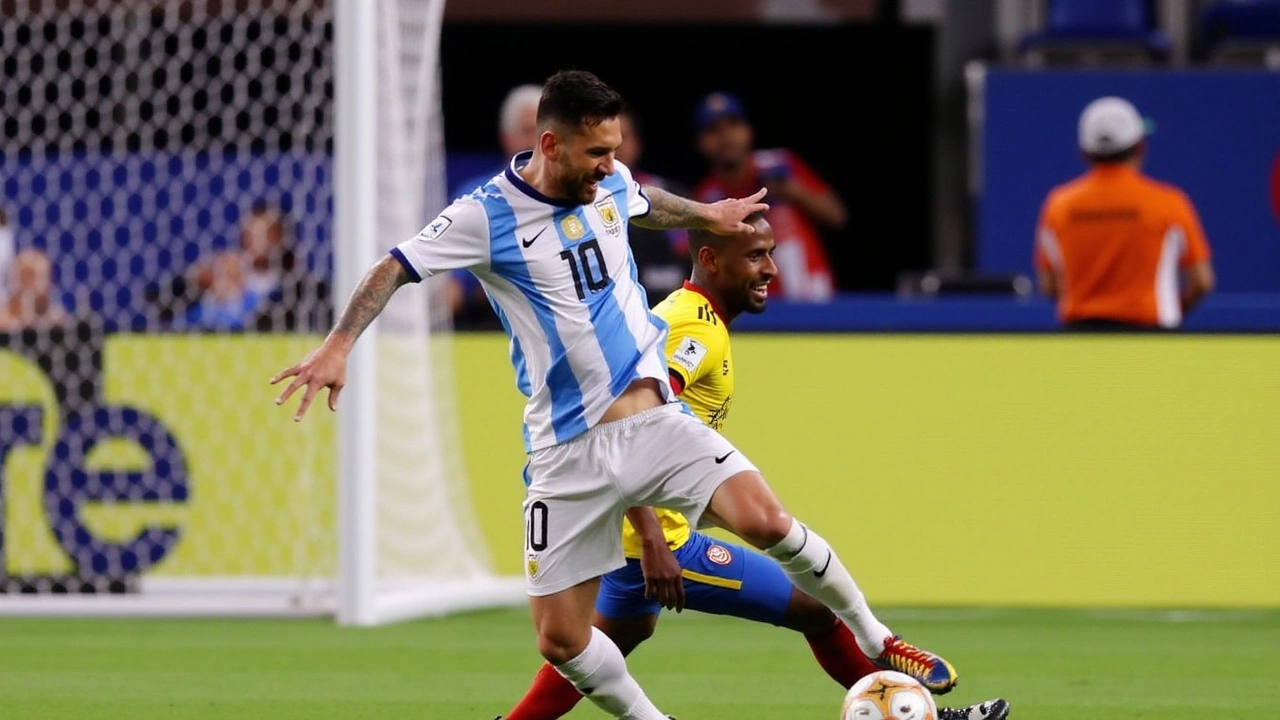Argentina vs Bolivia: A Dominant Performance by Messi and Co. in World Cup Qualifiers

In Sports
The much-anticipated match between Argentina and Bolivia at El Monumental in Buenos Aires unfolded against a tapestry of expectations and excitement. With the footballing world watching closely, Lionel Messi donned his captain's armband for Argentina on this decisive World Cup Qualifiers Matchday 10. It wasn't just another game; it was a platform for Messi and the Argentine squad to demonstrate their prowess, especially after drawing their previous match with Venezuela. Head coach Lionel Scaloni pulled a tactical rabbit out of the hat, exploring the potential of playing with both Julian Alvarez and Lautaro Martinez alongside the legendary Messi.
The absence of Emiliano 'Dibu' Martinez, due to suspension, necessitated some strategic adjustments. Geronimo Rulli stepped up, ready to guard the posts as the formidable Peruvian referee, Kevin Ortega, held the whistle. Ortega's familiarity with Argentina's style, having previously officiated a match with them in 2022, added an interesting dynamic to the contest. The kick-off at 8:00 PM (ET) was a spectacle watched by fans across the United States through multiple broadcasting platforms like Fubo (offering a free trial), Telemundo Sports Live, ViX, and UNIVERSO.
As fans filled the stands and televisions across the world buzzed with anticipation, the Argentine squad took to the pitch, driven by the desire to gather crucial points after their draw with Venezuela. Bolivia, buoyed by their prior victory over Colombia, entered the fray with equal zeal, eager to challenge their formidable opponents. The stakes were high, and the narrative was rich with potential drama. Messi's return to the Argentinian side was nothing short of spectacular, following his impressive stint with Inter Miami, where he had netted five goals in as many games. This form hinted at the magic he could weave on home ground.
Before the game, Scaloni's tactics were a topic of fevered discussion among football pundits and fans alike. The decision to consider both Julian Alvarez and Lautaro Martinez, alongside Messi in the potential lineup, suggested a high-octane, attacking approach aimed at overwhelming the Bolivian defense. This strategy was both a gamble and a statement. The proposed lineup was packed with talent, including stalwarts like Nahuel Molina, Cuti Romero, Nicolas Otamendi, and Nicolas Tagliafico, reinforcing the team's depth in every position. Supporting this defense was a midfield core of Rodrigo De Paul, Enzo Fernández, and Alexis Mac Allister, who were tasked with channeling play forward to the attacking trio.
The match commenced with a palpable intensity, and it wasn't long before Argentina began to assert their dominance. The opening goal arrived from Messi, much to the delight of the home crowd. His deft movement and clinical finishing illuminated what would be a memorable performance. Scaloni's gamble with the attacking lineup paid off as Messi demonstrated his dual role as a playmaker and goal-scorer. Not content with just opening the scoring, Messi went on to showcase his visionary play, providing two assists that saw Lautaro Martinez and Julian Alvarez adding their names to the scoresheet.
This 3-0 victory wasn't just a testament to the individual brilliance of Messi; it was a reflection of a cohesive team performance. Scaloni's strategy, a mosaic of calculated risks and confident playmaking, found harmony on the pitch. For Argentina, this triumph was more than just three points; it was a reaffirmation of their status as a powerhouse in the World Cup Qualifiers. It was a necessary morale boost, a reminder of what happens when their players find synergy.
For Bolivia, facing a team fired by the skill and hunger of Messi and his compatriots was always going to be a formidable challenge. They fought valiantly but could not stem the tide of Argentina's relentless attack. The match paints a vivid picture of the gap in class between the two teams, yet it also highlights the unpredictability and drama quintessential to World Cup qualifying stages.
Looking forward, both teams will draw lessons from this encounter. Argentina will likely refine their strategy further, building on this momentum to secure their place in the 2026 World Cup. Bolivia, on the other hand, will regroup, assessing their strategies, perhaps drawing inspiration to kindle an upset in their forthcoming fixtures. As the dust settles, the football community is left to bask in the artistry of the game and the hopes it inspires for future encounters. The victory revitalizes Argentina's campaign, one that promises yet more thrilling football moments as the road to 2026 continues.
Write a comment